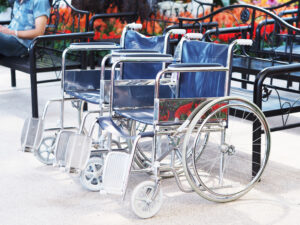I’ve lived in Elizabeth for nearly all my forty-three years, watching our city transform through economic shifts, demographic changes, and healthcare evolutions.
Through it all, one constant has remained: the vital role of our neighborhood pharmacies.
Not as mere pill dispensaries, but as healthcare anchors that have adapted to our community’s needs in ways that often go unrecognized.
Last winter, during that brutal February cold snap, I witnessed something at Rodriguez Pharmacy on Third Street that crystallized this reality.
An elderly man—confused, shivering, and speaking rapid Portuguese that few around him understood—had wandered in without a coat.
Before anyone could react, Teresa, the pharmacy technician who’s worked there for decades, emerged from behind the counter.

A Local Pharmacy At Your Service
She spoke softly to him in his native language, gently guided him to the consultation room, and made a series of calls. Within twenty minutes, his nephew arrived. The man had dementia and had wandered seven blocks from home.
This wasn’t a scheduled healthcare intervention. It wasn’t billable to insurance. But it was community wellness in its purest form, happening at a local pharmacy where staff recognized not just medications but the faces and stories behind them.
The Unsung Healthcare Heroes of Elizabeth’s Neighborhoods
Elizabeth’s healthcare landscape is complex—a patchwork of major medical facilities, community clinics, and specialty practices stretched across our densely populated city. Yet for thousands of residents, particularly in neighborhoods like Elizabethport and the East Ward, the most consistent healthcare relationship exists not with a physician but with a pharmacist they see weekly or monthly.
“People tell me things they won’t tell their doctors,” explains Carlos Jimenez, who has owned his pharmacy near the junction of Routes 1 and 9 for twenty-two years. “Sometimes because of language barriers, sometimes because of time constraints in medical appointments, but often because we’re part of their regular routine. They pick up prescriptions and groceries on the same afternoon. We’re woven into their normal life, not just reserved for when they’re sick.”
This integration into daily life creates healthcare moments that would never happen in traditional medical settings. Like when a customer buying cough medicine mentions their persistent symptoms, prompting a conversation that leads to a tuberculosis screening referral. Or when a regular picking up refills remarks on a new tremor in their hands, triggering a medication review that identifies a preventable drug interaction.
The Cultural Bridges That Make Healthcare Work
Elizabeth’s remarkable diversity—with over 50 countries represented among our residents—creates healthcare challenges that our local pharmacies navigate with unique skill. These aren’t just businesses that happen to employ multilingual staff. They’re cultural translation centers where healthcare becomes accessible to everyone from recently arrived Haitian immigrants to third-generation Portuguese Americans.
At Liberty Pharmacy near the Midtown neighborhood, prescription instructions are regularly provided in Spanish, Portuguese, Creole, and Ukrainian. But the cultural competence goes far deeper than language. When Mrs. Patel (no relation to the pharmacy owner with the same surname) expressed reluctance about a medication that conflicted with her Ayurvedic practices, her pharmacist didn’t dismiss her concerns. Instead, he spent nearly half an hour discussing how the prescribed treatment could complement her traditional wellness approaches.
“We’re not just translating words,” says Fatima Osei, a pharmacy manager on Elizabeth Avenue. “We’re translating entire healthcare concepts across cultural frameworks. When a patient from a culture with fundamentally different ideas about what causes illness receives a prescription, the explanation needs to bridge those worldviews or they simply won’t take the medication.”
This cultural bridging represents perhaps the most significant yet least quantifiable contribution of Elizabeth’s local pharmacies to our community’s health. It transforms prescribed treatments from foreign impositions into understood partners in wellness.
Where Everyday Health Happens Outside Hospital Walls
The formal healthcare system excels at addressing acute crises and managing complex conditions. What it often struggles with are the daily realities of preventive care and chronic disease management—precisely where Elizabeth’s pharmacies have carved out their essential role.
The Diabetes Management Revolution Happening Quietly in Elizabeth
Elizabeth’s diabetes rates exceed state averages, with particularly high concentrations in specific neighborhoods. While endocrinologists provide crucial specialized care, the day-to-day reality of diabetes management unfolds in community pharmacies across our city.
At Junction Pharmacy near the train station, what began as occasional blood glucose screenings has evolved into a comprehensive diabetes management program unlike anything I’ve seen elsewhere. Monthly group sessions combine medication reviews with practical cooking demonstrations using ingredients commonly found in local bodegas. Pharmacists collaborate with community health workers to address the social determinants affecting diabetes outcomes—from food access to housing stability.
When Joaquin Mendez, a construction worker and longtime Elizabeth resident, was diagnosed with type 2 diabetes, his doctor provided a treatment plan and a follow-up appointment scheduled three months later. It was his neighborhood pharmacist who sat with him the following day, explaining how to use his glucose monitor, discussing medication timing around his irregular work schedule, and connecting him with community resources.
“My doctor told me what to do,” Joaquin told me. “My pharmacist showed me how to do it in my actual life.”
Meeting Mental Health Needs Where They Emerge
Among the most profound shifts in Elizabeth’s pharmacy landscape is the growing role pharmacies play in addressing mental health—an area where traditional services remain woefully inadequate for our community’s needs.
The signs of this evolution are subtle but significant. Privacy screens and consultation rooms have become standard features, creating spaces where residents can discuss mental health concerns without stigma. Pharmacy staff receive enhanced training in recognizing signs of everything from postpartum depression to substance use disorders.
“We’re often the first to notice when someone’s mental health is deteriorating,” explains David Kim, whose family has operated a pharmacy in Elizabeth for three generations. “Maybe they’re not refilling their psychiatric medications, or perhaps we see concerning changes in someone who comes in regularly. We’ve developed relationships with community mental health providers that allow us to make warm handoffs when necessary.”
These interventions rarely make headlines, but they form a crucial safety net in a system with gaping holes. When formal mental health services have waiting lists stretching months, these informal support networks centered around neighborhood pharmacies become lifelines.
Economic Justice as Healthcare Justice
The financial reality of healthcare in Elizabeth cannot be separated from health outcomes. With median household incomes below state averages and higher uninsured rates, cost barriers routinely delay or prevent care for many residents.
Making Medication Affordable Through Persistence and Creativity
The labyrinthine systems of prescription coverage, manufacturer assistance programs, and discount options are deliberately complex. Elizabeth’s pharmacists have become expert navigators of these systems, often serving as financial advocates as much as healthcare providers.
When Leticia Gomez, a home healthcare aide without prescription coverage, received an asthma prescription with a $187 price tag, her neighborhood pharmacist initiated a process that reduced her cost to $27 through a combination of manufacturer coupons and therapeutic substitution. This wasn’t an exceptional case but a routine example of the financial advocacy happening daily.
Several Elizabeth pharmacies have pioneered innovative approaches to medication affordability, from in-house discount programs to formal partnerships with local churches and community organizations that help cover costs for residents in need. One pharmacy maintains a donation-based fund specifically to ensure that no regular customer goes without essential medication due to temporary financial hardship.
“We see the consequences when people can’t afford their medications,” says Raymond Washington, who operates a pharmacy in one of Elizabeth’s most economically challenged neighborhoods. “The human cost is immediate and devastating. The system is broken, so we’ve had to create our own solutions.”
Creating Economic Opportunity While Delivering Care
Elizabeth’s locally owned pharmacies represent significant sources of stable employment in a city where economic opportunity can be limited. Unlike chain pharmacies where profits flow to distant corporate headquarters, these independent businesses keep both healthcare resources and economic benefits circulating within our community.
Several have established structured career advancement programs that have transformed entry-level positions into sustainable healthcare careers. Maria Gonzalez started as a cashier at an independent pharmacy near Elizabeth’s downtown while attending Elizabeth High School. Fifteen years later, after pharmacy technician certification and pharmacy school, she returned as a managing pharmacist—her entire career pathway supported by the same local business.
These economic contributions strengthen Elizabeth’s overall health in ways that extend far beyond medication management. Employment stability, career advancement, and businesses invested in community well-being create positive ripple effects across all health indicators.
The Future of Community Wellness in Elizabeth
As healthcare continues evolving, Elizabeth’s pharmacies are pioneering approaches that recognize our city’s unique needs and strengths. Several have integrated community health workers into their teams, creating bridges between clinical care and neighborhood realities. Others are exploring partnerships with local food sovereignty movements, recognizing that medication adherence means little when food insecurity undermines basic health.
What makes these innovations significant isn’t just their creativity but their emergence from within our community rather than being imposed from outside. They represent healthcare solutions designed by and for Elizabeth residents, responsive to our specific needs.
The most valuable aspect of our local pharmacies isn’t something you’ll find listed on a services brochure or advertised on a website. It’s the accumulated knowledge of our community’s health patterns, cultural contexts, and daily realities. It’s pharmacists who remember when your child was born, who know which church you attend, who understand the specific health challenges in your particular neighborhood.
In an increasingly fragmented healthcare landscape, these neighborhood anchors provide something that has become rare and precious: care that sees you as a whole person connected to a specific community and place. That approach to wellness can’t be franchised, automated, or replaced by mail-order alternatives. It’s healthcare as it should be—personal, accessible, and deeply rooted in the community it serves.




